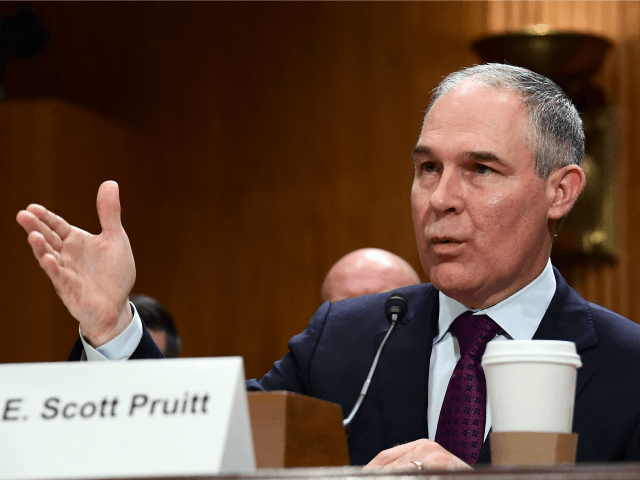The newly appointed Environmental Protection Agency Administrator Scott Pruitt will welcome President Donald Trump to the massive EPA government building on Tuesday. The president will then sign an executive order that will start rolling back the Obama-era Clean Power Plan.
Trump’s executive order will be another major step for Pruitt’s effort to restore the EPA to its limited authorities.
“We’re going to roll it back, those things that were unlawful, we’re going to roll back those things that were an overreach, we’re going to roll back the steps taken by the previous administration,” Pruitt said in an interview with Breitbart News inside his office at the EPA federal building in Washington D.C. The enormous federal building is right across the street from the Old Post Office building, recently renovated into the Trump International Hotel.
Trump’s entry in the building will likely trigger renewed sadness for some agency bureaucrats who were reportedly in tears after Trump won the election.
In February, sources speaking to Inside EPA suggested that demoralized employees would be unlikely to attend an event with Trump and Pruitt, as they were deeply dissatisfied over the administration’s proposed changes the agency. Trump’s budget outline, released earlier this month, threatened to slash the department’s funding by 31 percent. The executive order will not only order a review of the Clean Power Plan but also change Obama-era executive orders on climate change and carbon emissions regulations, a dramatic change from Obama’s legacy that prioritized a regulatory agenda.
But Pruitt feels energized by the president’s visit, kicking off a set of new priorities for the agency that he believes lost its way in the Obama years. As Trump’s EPA administrator, Prutt will also sign a series of rules and procedures during the president’s visit to reform the agency.
Rescinding the Clean Power Plan, Pruitt explained was “a snapshot of the future” of how the Trump administration would approach regulatory reform.
Under the Obama administration, Pruitt said that the oil, coal, and natural gas industries were under federal “regulatory assault,” which killed energy jobs around the country.
“I think the greatest impediment we’ve had on economic growth is regulatory uncertainty,” he said. Trump, he explained, understood that the regulatory process had become so tangled that it was difficult for companies to invest and grow.
Pruitt’s philosophy is an example of the Trump administration’s goal to dismantle the federal government’s overbearing bureaucracy, for the sake of boosting economic growth.
“We have situations here, and this is not just unique to the EPA, it’s other agencies at the federal level as well that do permitting, where it takes eight or nine years to get a permit to do something,” he said. “Well that’s not a decision, that’s obstructionism.”
Pruitt explained that he wanted to restore confidence among businesses and workers in the energy industry, particularly in coal, natural gas, and oil.
“Agencies at the federal level are part of the executive branch, they exist to enforce the law, not make the law,” he said.
Pruitt describes his philosophy as “EPA originalism.” Part of his goal, he said, was to re-focus the agency toward Congress’s original authorities. That’s sending a different message to the industries regulated by the EPA.
“I can just tell you there’s buoyancy, buoyancy across the country that there’s a different attitude, a different belief, a different view,” Pruitt said. “We can be both pro-growth and pro-environment, we’ve done it as a country throughout our existence.”
Some of the rules passed by the Obama administration, Pruitt said, actually hurt the agency as they that were “untethered” to the legal statutes, often at the behest of well funded environmental groups that donated to Democrats. Some of those efforts were halted in court, creating more uncertainty about the agency’s authority.
“When you look at the outcome of that kind of agenda, it was detrimental,” he said.
As the Attorney General of Oklahoma, Pruitt led the legal charge against the EPA, arguing that the agency was overstepping it’s authorities. He sued the agency 13 different times, putting many of the Obama-era rules in legal deadlock.
Pruitt also has a reputation of challenging environmentalist priorities like climate change, but his critics told Breitbart News columnist James Delingpole that repealing the EPA’s Endangerment Finding on CO2 emissions were not included in the Trump’s executive order. Pruitt confirmed to Breitbart News that the executive order would not repeal the EPA’s Endangerment finding, but he appeared open to addressing it in the future.
“I think that if there are petitions for reconsideration for the endangering findings, we’ll have to address those at some point,” he said. “I don’t know if they’ve actually been filed in that regard, but our objective, and our role is to do what the law requires.”
Pruitt believes that the agency should return its focus to tackling big environmental cleanup projects.
Part of restoring the EPA’s original mission, he explained, was refocusing the agency on the 1300 hazardous “superfund sites” designated by the agency as priority areas for cleanup.
“Many of those sites … on this national priority list have been on that list for 30-40 years, that doesn’t sound like a priority list to me,” he said. He cited the Port of Portland in the state of Oregon and the mining cleanup in Butte, Montana as two examples of designated “superfund” agencies that need renewed attention.
“We need to get busy with some new ways to address those,” Pruitt said.

COMMENTS
Please let us know if you're having issues with commenting.